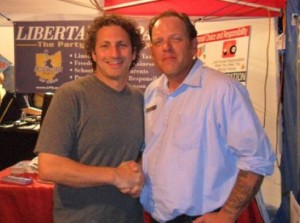Media interview with Columbus, Ohio City Council candidate Robert Bridges
 The following is an excerpted Columbus Underground interview with Robert Bridges, one of two Libertarian candidates running for the office of Columbus City Council this November. Robert is running on a platform focused on fiscal responsibility at City Hall, and a reduction in government intrusiveness, specifically as it relates to small businesses and economic development.
The following is an excerpted Columbus Underground interview with Robert Bridges, one of two Libertarian candidates running for the office of Columbus City Council this November. Robert is running on a platform focused on fiscal responsibility at City Hall, and a reduction in government intrusiveness, specifically as it relates to small businesses and economic development.
Bridges’ website can be found at http://www.votebridges.org/.
Q: Can you tell us a bit about your personal, professional, and political background?
A: I am not an attorney. I am not a career politician. I am a blue-collar, everyday citizen. I am running for City Council because I believe that it is time for change; a fresh voice. We are ready for common sense representation. I come from a blue-collar background. My father was a union factory worker and a Pentecostal minister. My mother was a homemaker who earned two college degrees while raising her children. I understand the struggles that so many families face, because I have lived it. Happily married for 14 years, my wife and I have raised two beautiful children. We also foster for various animal rescue groups around the city. I want to limit government intrusion in our lives, not increase it. Our diversity should be celebrated, not challenged. You will see me on the streets, listening to you, both before and after the campaign.
Q: Downtown Columbus has grown residentially and commercially over the past 10 years, due to public investment and a renewed national focus on urban living. What further needs to be done from a public policy level to continue the growth of the core of our city?
A: To have a vibrant urban center, people – residents and business owners alike – need to feel safe. I see that as our biggest issue, and the only major thing holding us back from true urban living. Because of the deferred retirement option offered to police and fire in 2003, we will experience an exodus of first responders at the end of 2011. With a limited tax base and a shrinking economy, we have to look for ways to stay ahead of potential problems – otherwise we’ll lose hard-won ground in the coming months. For this reason I am steadfastly against spending any new sources of tax revenue (such as from the casino) on anything other than classes of new police, fire and 911 dispatchers. This is why we lost residents to the suburbs in the 1990′s, and we will do so again if we do not act now. That would be a devastating loss to our beautiful downtown.
Q: A common anecdotal complaint about local government centers on a lack of adequate city services: unplowed streets, lack of curb-side recycling, potholes, too few proactive police patrols, et cetera. Is this a funding issue, a geographic issue, or something else entirely?
A: Something else entirely: It’s a management issue. I believe that all these issues are essential city services, and should be a priority. I am a socially responsible fiscal conservative. This means I rather enjoy finding creative ways to pay for programs that are environmentally necessary. Curb-side recycling is one of those programs. Bureaucrats tend to look in one direction – taxes – and that’s it. There are other avenues that could be explored, such as corporate sponsors, partnering with a waste management team, partial subsidies, and more. Running the city is a business, and our customers expect certain services. There is no reason we can’t do a better job of plowing the streets. It’s a few days out of the year – if there are streets our plows are too big for, let’s hire some locals with front plows to do the work, or hire seasonal help to get through the few weeks we’ll need them for. We’ve become accustomed to a very reactive council, and that has to change.
Q: Small businesses are the cornerstone of our economy. What are the biggest challenges that our small business community currently faces, and what would you do differently to address those challenges?
A: The obvious answer to this is the economy. Everyone has been affected in some way, and we’ve all had to do more with less. That being said, access to capital is a big problem for small businesses. Banks are reluctant to lend, and while a city councilperson can’t change federal laws, we can create some local incentives to encourage investment in our citizens. It is important to recognize that we cannot ask banks to socialize the risks they take as part of their business. In other words, there won’t be a bailout for anyone. So this has to be managed carefully, with thought of the “after” as well as the “before.”

